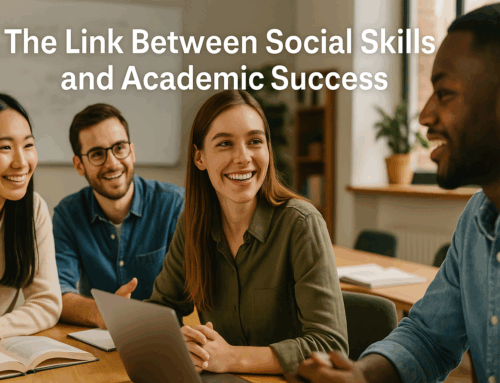Improve Your Self-Awareness Skills
Be Aware
Developing strong Self‑Awareness Skills is foundational to personal and academic growth. At its core, awareness of one’s thoughts, emotions and behaviours enables better understanding of how one learns, interacts and responds to different situations.
When students cultivate this level of awareness, they lay the groundwork for effective Personal Development, not only as learners but as socially capable individuals navigating increasingly complex environments.
The importance of emotional and behavioural insight continues to grow across both academic and social contexts. Studies have shown that students who reflect on their emotional states and behavioural tendencies are more successful at managing time, identifying areas for academic improvement, and maintaining motivation during stressful periods (Casel.org).
These qualities align closely with what is often described as metacognitive awareness—the ability to think about one’s own thinking. Research links this capacity directly with higher academic performance and emotional resilience (Brackett et al., 2012; Durlak et al., 2011).
Strong Relationship Skills, such as empathy, active listening and responsible decision-making, are closely tied to Self-Awareness Skills.
When students are aware of their internal emotional states, they are more likely to engage with peers respectfully, communicate clearly and resolve conflicts constructively.
This creates healthier learning environments and stronger peer connections.
The benefits of these competencies were also explored in our earlier article, [The Link Between Emotional Intelligence and Academic Success]. There, we examined how developing Social Skills and Self-Management Skills contributed to improved academic outcomes and long-term employability.
This article builds upon those findings, zooming in on the specific role of Self-Awareness Skills as a catalyst for deeper Interpersonal Development and academic confidence.
In the sections that follow, we will provide practical, research-backed strategies that help students cultivate Self-Awareness Skills as part of their daily routines.
Each approach is designed to be relatable and applicable, supporting long-term Personal Development for Students and equipping them with lifelong tools to navigate learning, relationships and future careers with greater clarity and self-direction.
What Are Self-Awareness Skills?
Self-Awareness Skills refer to a student’s ability to consciously recognise, reflect on, and understand their own thoughts, emotions, and behaviours.
These skills are foundational to making informed decisions, adjusting responses in challenging situations, and understanding how one’s actions impact others.
While often discussed in the broader context of emotional intelligence, focusing on self-awareness allows for clearer, more practical development pathways—especially when addressing the needs of students.
At their core, Self-Awareness Skills enable students to answer questions like:
- What am I feeling right now and why?
- How do my feelings affect the way I study, interact, or respond to conflict?
- What behaviours or reactions do I notice repeating, and are they helpful or harmful?
Unlike abstract emotional traits, Self-Awareness Skills are observable and teachable. They form part of the larger framework of Personal Development, contributing to improvements in focus, academic motivation, behaviour regulation, and goal-setting.
These outcomes are especially relevant when schools aim to foster Personal Development for Students in a structured, measurable way.
Students who develop strong self-awareness are more likely to notice when they’re becoming distracted or disengaged, and are better equipped to re-centre their focus.
They can identify triggers—such as test anxiety, peer tension, or low motivation—and take steps to address them in real time.
These students also tend to form healthier peer connections because their emotional insight supports better Relationship Skills, including empathy, active listening, and respectful communication.
This focus aligns directly with the first article in this series, The Link Between Emotional Intelligence and Academic Success, which established that students with higher levels of Social Skills and Self-Management Skills were more likely to perform well academically and transition successfully into early career stages.
In that context, Self-Awareness Skills were implicitly present as the internal compass guiding students toward more mature and adaptive behaviours, part of a broader pattern of Interpersonal Development and learning resilience.
In short, Self-Awareness Skills are not simply ‘nice to have’. They are teachable, impactful, and necessary for students who wish to thrive both academically and socially.
As we explore in the next section, these skills are also a critical starting point for intentional, long-term Personal Development for Students.
The Role of Self-Awareness in Personal Development for Students
Developing Self-Awareness Skills is the starting point for meaningful and sustainable Personal Development for Students.
It allows young people to better understand who they are, how they learn, and how their thoughts and emotions shape their actions. For students navigating the demands of study, relationships, and future planning, this internal insight becomes an invaluable tool for success.
Self-awareness gives students the ability to pause and reflect on their responses to academic challenges. For example, a student who regularly procrastinates may, through reflection, realise they are avoiding tasks out of fear of failure rather than disinterest.
Recognising this thought pattern is the first step towards changing it. These kinds of breakthroughs can significantly improve motivation, study consistency, and academic performance.
In the social environment of school or university, Self-Awareness Skills also play a pivotal role in developing strong Relationship Skills. A student who understands their own emotional triggers is more likely to communicate with clarity, avoid unnecessary conflict, and respond constructively in group settings.
This not only improves classroom dynamics but contributes to a safer, more inclusive learning environment.
From an advisor or educator’s perspective, Self-Awareness Skills are often what differentiate a student who reacts from a student who responds. The former may act impulsively or emotionally, while the latter pauses to reflect before making a decision. This reflective capacity is essential for sound judgement and behavioural maturity—key indicators of ongoing Personal Development.
Also, Personal Development for Students is no longer limited to career planning or academic tracking. Increasingly, schools and tertiary institutions are integrating emotional and reflective competencies into wellbeing frameworks and life skills programmes.
By equipping students with strategies to identify their emotional states, evaluate their habits, and understand their values, educators are preparing them not only for assessments, but for adulthood.
To support this growth, it is essential that Self-Awareness Skills are not viewed as abstract ideals, but as teachable competencies with measurable benefits.
Whether through goal-setting exercises, emotional check-ins, or feedback mechanisms, the consistent practice of self-awareness can transform the student experience from reactive to intentional, and from passive to empowered.
Strategy 1: Start a Reflection Routine
One of the most effective and accessible ways to build Self-Awareness Skills is by adopting a consistent reflection routine.
This strategy invites students to develop insight into their emotions, decisions, habits, and interactions—without needing special tools or supervision.
The act of structured reflection encourages students to pause and make sense of their experiences, linking internal awareness to external behaviour.
Reflection supports Personal Development by helping students identify what motivates them, what holds them back, and how they react to challenges.
It also encourages emotional accountability, reinforcing important Relationship Skills such as empathy and responsible communication.
Over time, this builds clarity, confidence, and emotional maturity—critical outcomes in the wider context of Personal Development for Students.
The key to a successful reflection routine is simplicity and consistency. Students should begin by setting aside five to ten minutes daily to answer a single prompt or question. Written journaling, voice notes, or private video logs all work well.
The purpose is not to record everything, but to develop a habit of emotional honesty and critical thought.
Two-Week Case Example: Reflection Habits in Action
Below is a sample two-week schedule to guide students through an introductory reflection routine.
Each day is linked to a specific area of Self-Awareness Skills, offering a realistic path to forming habits that support academic and personal growth.
|
Day |
Reflection Prompt |
Case Example |
|
Monday (Week 1) |
What am I feeling right now, and what triggered it? |
Ali, 17, notes anxiety before a science test. He identifies that poor sleep and skipping breakfast played a role. |
|
Tuesday |
What’s one thing I handled well today? |
Sophie, 16, reflects on how she stayed calm when a group project went off track. |
|
Wednesday |
What’s one thing I could have done better? |
Jackson, 15, admits to interrupting a classmate during discussion and sets a goal to listen more actively. |
|
Thursday |
What is one strength I used today? |
Leila, 18, identifies her organisation skills after managing a busy schedule without stress. |
|
Friday |
How did I respond to feedback this week? |
Tyrese, 17, writes about receiving constructive criticism from a teacher and resisting the urge to feel defensive. |
|
Saturday |
What patterns did I notice in my mood or behaviour this week? |
Emily, 16, observes that she’s more irritable on days when she skips lunch or studies late into the night. |
|
Sunday |
What do I want to improve next week? |
Zane, 17, decides to prepare presentations earlier to reduce last-minute stress. |
|
Monday (Week 2) |
Who supported me today, and how did I show appreciation? |
Jess, 15, recalls how a friend helped her study and sent them a thank-you message. |
|
Tuesday |
What did I learn about myself today? |
Ben, 18, realises he prefers quiet study environments after struggling in a noisy café. |
|
Wednesday |
What situation made me uncomfortable, and why? |
Amira, 16, recalls feeling excluded in a group task and reflects on how past experiences influenced her reaction. |
|
Thursday |
When did I feel proud of myself this week? |
Kai, 17, feels proud after helping a younger student with a maths question. |
|
Friday |
How did I manage stress today? |
Lucia, 16, used deep breathing before a presentation and felt more confident. |
|
Saturday |
What is one relationship I want to strengthen, and how can I start? |
Marcus, 15, identifies his older brother and plans to invite him for a walk. |
|
Sunday |
What mindset will I carry into the new week? |
Talia, 18, chooses to focus on effort rather than outcomes for her upcoming assessments. |
This kind of structured, student-led reflection nurtures long-term Self-Awareness Skills. It helps students notice emotional patterns, appreciate growth, and make deliberate changes—an essential process for holistic Personal Development.
Whether through journaling, audio logs, or peer reflection groups, the power lies in the habit itself.
Strategy 2: Seek Constructive Feedback from Others
While self-reflection is a powerful starting point, meaningful Self-Awareness Skills are often developed through interactions with others.
Constructive feedback from peers, educators, mentors or family members provides a mirror through which students can view their behaviour and impact more clearly. When received with openness and curiosity, feedback becomes an accelerator for growth, reinforcing both Relationship Skills and long-term Personal Development.
Many students tend to view feedback solely through the lens of performance, marks on an exam or commentary on an assignment.
However, feedback on emotional expression, communication habits, and collaboration style is equally important. These insights allow students to assess how their actions are perceived and interpreted, which is essential for developing emotional literacy and behavioural flexibility.
One of the key benefits of seeking feedback is that it breaks the echo chamber of internal thought. A student may believe they are approachable or clear in communication, but regular feedback may reveal that they unintentionally interrupt or appear disinterested in group discussions.
Having this external perspective helps align self-perception with observed reality, a vital component of developing mature Self-Awareness Skills.
To introduce this habit into daily school life, student advisors can encourage learners to ask simple, low-risk questions such as:
- Did I explain my point clearly in that group discussion?
- Was I respectful in how I responded during that disagreement?
- What’s one thing I could do better when working with others?
These types of questions invite specific, actionable responses. Over time, they foster trust and emotional resilience, qualities tied directly to strong Relationship Skills.
For younger students or those newer to this practice, structured peer review exercises or teacher-led feedback circles offer a safe, guided way to begin. Older students can benefit from keeping a “feedback log” where they record and reflect on comments received across a week or month.
Not every piece of feedback must be accepted wholesale, but all should be considered with a mindset of curiosity, not defence.
This habit reinforces the idea that Personal Development for Students is not only an internal process but also a social one. When students learn to invite feedback rather than fear it, they build confidence, accountability, and interpersonal insight, all of which elevate their academic engagement and social maturity.
Strategy 3: Practise Mindful Self-Observation
A core component of developing Self-Awareness Skills is learning to observe one’s own behaviour, emotions and thoughts in the moment, rather than only reflecting in hindsight.
This process—known as mindful self-observation—enables students to respond to challenges thoughtfully rather than react impulsively.
It strengthens emotional regulation and encourages a calm, present-centred approach to both academic and social situations.
Mindful self-observation involves becoming aware of bodily cues (such as tension, fidgeting, or heart rate), emotional changes (irritation, anxiety, frustration), and recurring thought patterns (self-doubt, distraction, defensiveness) as they arise.
The aim is not to judge or suppress these experiences, but to notice them, name them, and use that awareness to choose a more constructive response.
For students, this approach has tangible benefits. In a classroom context, it may help a student recognise rising frustration during a group project, giving them the chance to pause and refocus before conflict escalates.
On exam day, a student might become aware of racing thoughts and use breathing techniques to regain composure. These moments of awareness, though small, are where real Personal Development takes place.
Mindful self-observation also supports healthier Relationship Skills. Students who notice when they are disengaged, overly assertive, or emotionally reactive are better positioned to adjust their behaviour in social settings.
This makes them more approachable, respectful, and adaptable, traits that contribute positively to learning environments and group collaboration.
To support students in cultivating this practice, advisors and educators can recommend:
- Three-Minute Breathing Spaces: Short pauses during the day to check in on thoughts, mood, and body state.
- Classroom Grounding Techniques: Simple exercises like noticing five things you can see, four you can hear, three you can touch, etc.
- Emotion Tracking Apps or Charts: Digital tools or daily logs where students can mark how they feel and why.
- Trigger Journals: Notebooks for recording specific situations that cause discomfort or stress and what was noticed in the moment.
This form of practical mindfulness nurtures emotional balance, resilience, and adaptability—all qualities that deepen a student’s overall Personal Development for Students journey.
When these moments of awareness become habitual, students gain not only control over their behaviour, but confidence in their ability to handle unpredictable academic and social demands.
Encouraging students to simply pause and notice what’s happening inside them is not just a wellbeing exercise, it’s a training ground for maturity.
These daily check-ins are where emotional awareness becomes behavioural strength, and where Self-Awareness Skills shift from theory to lived experience.
Strategy 4: Set and Track Personal Development Goals
Once students begin to develop their Self-Awareness Skills, the next step is to translate those insights into tangible goals.
Setting and tracking personal development objectives encourages students to apply their reflections in a structured, future-focused way. When students are intentional about their growth, they become active participants in their education, rather than passive recipients.
This process sits at the heart of effective Personal Development. By setting specific, realistic goals, particularly in relation to mindset, behaviour, and interpersonal interactions, students learn to treat personal growth with the same level of purpose and planning as academic study.
It also helps them monitor progress over time, celebrate growth, and course-correct when challenges arise.
Goal-Setting Techniques for Students
To be most effective, goals should follow a structured format.
The SMART model (Specific, Measurable, Achievable, Relevant, Time-bound) remains a highly effective tool for students at all levels. Examples include:
- “I will speak at least once in each group discussion this week.”
- “I will practise deep breathing for two minutes before every test for the next month.”
- “I will ask one peer and one teacher for feedback on my communication style by Friday.”
Each of these goals builds directly on Self-Awareness Skills by encouraging the student to engage, reflect and improve a targeted behaviour.
Personal Development Tracking Tools
Advisors and educators can support students by introducing simple tools for goal tracking:
- Weekly Progress Charts: Tick-box systems where students note goal completion and write brief reflections.
- Peer Accountability Partners: Pairs or small groups who check in on each other’s development goals.
- Goal Journals: Dedicated spaces where students document what they’re working on, why it matters, and how they plan to measure success.
- Reflection Reviews: End-of-week summaries asking: Did I achieve my goal? What worked? What could I try differently next time?
When embedded consistently, this approach supports measurable and meaningful Personal Development for Students. It also encourages a sense of agency, students learn that change isn’t just something that happens to them, but something they can initiate and guide.
Tracking emotional and behavioural goals alongside academic ones also supports stronger Relationship Skills. For example, a student who sets a goal to pause before responding in conflict situations may see improvements not only in self-regulation, but also in how peers perceive their maturity and respectfulness.
Above all, goal-setting reminds students that Self-Awareness Skills are not just internal, they are tools for shaping real-world outcomes.
Whether the goal is to reduce anxiety, build communication confidence, or become a better listener, the act of setting and pursuing that goal moves personal growth from passive insight to deliberate action.
Strategy 5: Understand Your Triggers and Patterns
An often overlooked yet vital aspect of building Self-Awareness Skills is the ability to recognise emotional triggers and behavioural patterns.
These are the automatic responses students develop over time, often shaped by past experiences, environmental stressors, or internal fears. When left unexamined, such patterns can reinforce self-sabotaging behaviours—particularly in high-pressure academic and social settings.
Understanding what causes emotional spikes or disengagement enables students to proactively manage their responses rather than feel controlled by them. For example, a student may notice they become defensive when receiving feedback, or anxious when called upon in class.
These reactions, once identified, can be explored and re-shaped into more productive behaviours—supporting long-term Personal Development.
This process involves tracking patterns across time and situations. Students should be encouraged to observe recurring reactions and ask:
- When do I feel most stressed, frustrated, or overwhelmed?
- What kind of situations tend to drain or motivate me?
- What emotions keep surfacing in particular subjects or social settings?
By naming the emotion, identifying the cause, and tracing the pattern, students deepen their Self-Awareness Skills and become more emotionally agile.
Practical Activity: Trigger Mapping
Advisors and student support staff can guide learners through a simple “trigger mapping” activity:
- Identify the Situation – Describe a moment where you felt emotionally reactive.
- Name the Emotion – What did you feel? Angry, embarrassed, stressed?
- Explore the Trigger – What caused that emotion? Was it a person, tone, setting, or thought?
- Note the Pattern – Is this reaction familiar? When else has it happened?
- Plan a Response – What could you try differently next time?
This exercise promotes emotional literacy and empowers students to take ownership of how they think and respond. In the context of Personal Development for Students, it bridges the gap between reflection and action.
Case Example:
Lina, 16, notices she often becomes agitated during group work when her ideas are dismissed. Through reflection and peer discussion, she realises she links this to past experiences of not being heard at home. With support, she practices communicating her ideas more assertively and listening actively to others. Over time, her confidence and collaboration skills improve noticeably.
Not only does Lina’s experience highlight the value of emotional insight, it also demonstrates how Self-Awareness Skills support better Relationship Skills.
By understanding her own reaction, she improved her group participation and reduced peer conflict.
This level of awareness strengthens not just classroom performance, but interpersonal resilience, foundational attributes in a student’s journey toward holistic Personal Development.
Embedding Self-Awareness into Everyday School Life
For Self-Awareness Skills to make a lasting impact, they must move beyond individual exercises and become part of the wider educational environment.
Embedding emotional reflection and self-monitoring into everyday school life ensures that students regularly practise and apply these abilities, rather than viewing them as separate from academic or social development.
This kind of integration fosters a school culture where growth, feedback and emotional insight are part of the norm. It reinforces the idea that Personal Development is a shared responsibility between students, teachers, and support staff—not a solitary pursuit.
Everyday Classroom Strategies
Teachers and classroom leaders play a critical role in modelling and reinforcing Self-Awareness Skills. Subtle yet consistent routines can have a significant impact.
Examples include:
- Daily Emotional Check-Ins: A quick poll or written note where students rate their mood or energy level and identify one influencing factor.
- Reflection Starters: Open-ended prompts at the end of lessons, such as “What challenged you today?” or “How did you respond when things got difficult?”
- Pause Points: Moments during lessons where students are encouraged to reflect silently before answering, helping them observe their impulses and emotions.
These techniques require minimal time yet send a strong message: self-reflection and emotional growth are as valuable as academic content.
Role of Advisors and Support Staff
Student counsellors, wellbeing coordinators and pastoral care teams are ideally placed to deepen and personalise this development.
By creating space for students to explore emotions, set goals, and unpack social challenges, these roles add structure and accountability to Personal Development for Students.
- Self-Awareness Journals can be introduced during one-to-one check-ins.
- Peer Coaching Programmes allow students to support each other’s reflective growth with guided discussion formats.
- Emotional Regulation Plans help students with recurring challenges build personalised strategies based on past patterns.
This approach also supports the development of Relationship Skills, as students learn to express themselves clearly, receive feedback with maturity, and understand how their behaviour affects others.
Building a Reflective School Culture
For schools aiming to make a broader shift, whole-school initiatives can reinforce Self-Awareness Skills as a shared value.
These might include:
- Termly Personal Development Themes integrated across subjects
- Whole-class reflection projects or portfolio tasks
- Visible displays of student-written affirmations, goals, or reflection prompts
- Celebrations of growth milestones, not just academic achievements
Such practices affirm that emotional literacy and reflection are indicators of progress in their own right, and that character is shaped just as intentionally as curriculum knowledge.
By weaving these practices into school culture, Self-Awareness Skills evolve from abstract ideals into everyday habits. Students learn to think critically about themselves not just in response to problems, but as a way of moving through the world.
The result is a more engaged, grounded and emotionally intelligent student body—one that is better prepared for both the demands of study and the responsibilities of life.
To summarise…
Developing strong Self-Awareness Skills is not just an academic enhancement, it is a lifelong asset.
When students take time to understand their emotions, patterns, triggers and goals, they begin to interact with the world from a place of clarity and control.
These insights form the basis of intentional choices, both in the classroom and beyond—and strengthen students’ ability to manage stress, learn effectively, and connect meaningfully with others.
Each of the strategies explored in this article offers a practical way for students to build their own reflective capacity. From structured journaling routines to trigger awareness, from mindful observation to goal tracking, every technique reinforces the broader aim of purposeful Personal Development.
Importantly, these approaches are accessible, they don’t require advanced tools or complex systems, only consistency and a willingness to grow.
As students develop these habits, the benefits reach beyond the self. Their Relationship Skills improve, collaboration becomes more constructive, and conflict becomes easier to navigate.
In a school context, this translates into more cohesive classroom environments, stronger peer connections, and more confident learners.
For educators, counsellors, and support staff, embedding these practices within school culture is an investment in the whole person, not just the test-taker.
When Personal Development for Students is placed at the centre of the learning experience, we empower young people not only to succeed academically, but to become thoughtful, resilient and emotionally intelligent contributors to society.
The path to deeper self-awareness is not a quick fix. It is a steady process of noticing, reflecting, adjusting and growing. But for those who begin today—even with one small habit—the long-term transformation can be profound.
Articles to further your Emotional Intelligence:
“Behavioural Skills in the Workplace: What Employers Really Look For”








